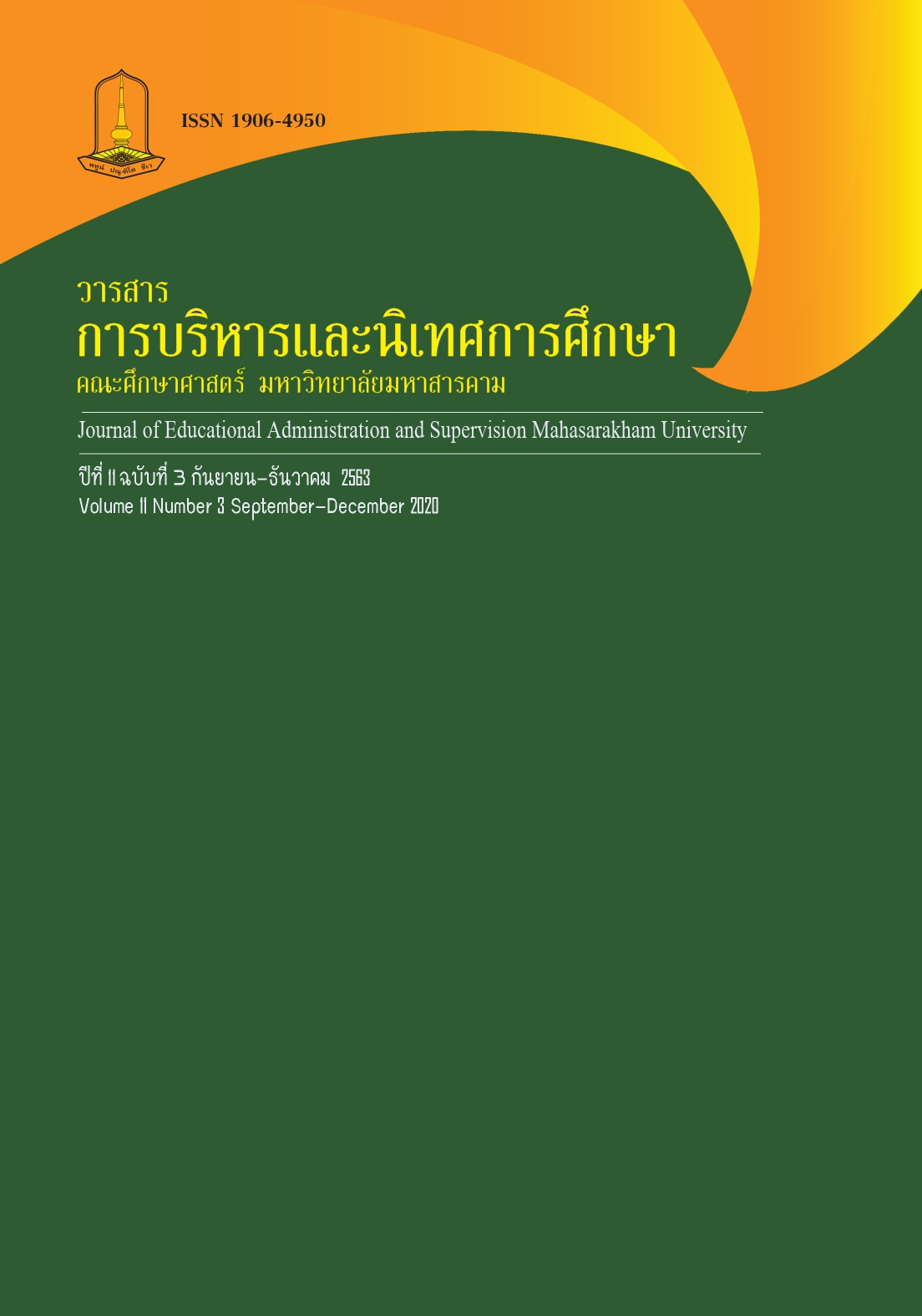The Study of Development Problem-solving Thinking Skills for 2nd Year Kindergarteners by Learning 5S Science Process has he Objectives
Main Article Content
Abstract
The study of developing problem-solving, thinking skills for 2nd year kindergarteners by learning 5S science process. A sample group in this research was Kindergarten students, year 2/5, Municipality School, 3rd December, Yasothon Municipality, Yasothon Province, academic year 2018, 30 students. This research has the objectives; to produce and experiment a model of experienced-learning organization with a 5S scientific process. It is the research to prepare lessons and extend the network consisting of 5 steps. 1) To study general information about the context of scientific actions to promote 2nd year kindergarteners’ problem solving skills. 2) To develop a theoretical account of experience management with a 5S scientific process to enhance their problem-solving thinking skills. 3) To experiment by using scientific processes, activities to encourage their problem solving skills. 4) To study the learning satisfaction of the 2nd year kindergartener about the experience of applying the 5S scientific process. 5) To interpret the lessons and extend the outcomes. The research instruments consisted of 1) in-depth interview form 2) the 5S scientific process guide including 42 experienced-learning lesson plans 3) 42 experienced-learning activities 4) Problem solving skills evaluation form 5) learning satisfaction questionnaires The results of the study found that 1) The 5S scientific process used to promote 2nd year kindergarteners’ problem-working skills are effectively equal to 82.54/83.50, which was higher than the standard (80/80). The post learning average score of 2nd year kindergarteners’ problem-working skills are significantly higher than pre learning at. 01. 3) The students were very gratified with the activities. 4) The results of interpreting, reflecting and extending were shown that the 5S scientific process used to promote 2nd year kindergarteners’ problem-solving skills was organized with 42 scientific process lesson plans and activities practiced such as observation, doubting, hypothesis, investigation and closing. 5) The 2nd year kindergarteners in other network schools have more proficient problem solving skills
Downloads
Article Details
References
กระทรวงศึกษาธิการ. (2560). หลักสูตรการศึกษาปฐมวัย พุทธศักราช 2560. กรุงเทพฯ:
สำนักวิชาการและมาตรฐานการศึกษา สำนักงานคณะกรรมการการศึกษาขั้นพื้นฐาน. (2553). ทฤษฎีการเรียนรู้เพื่อพัฒนากระบวนการคิดต้นแบบการเรียนรู้ตามหลักด้านทฤษฎีและแนวปฏิบัติ. กรุงเทพฯ: กระทรวงศึกษาธิการ.
กุลยา ตันติผลาชีวะ. (2551). รูปแบบการเรียนการสอยปฐมวัยศึกษา. กรุงเทพฯ: เอดิสันเพรส โปรดักส์ จำกัด.
ชัยยงค์ พรหมวงศ์. (2550). ประมวลสาระชุดวิชาการพัฒนาหลักสูตรและสื่อการเรียนการสอน. นนทบุรี: มหาวิทยาลัยสุโขทัยธรรมาธิราช.
ทิศนา แขมมณี. (2555). การเรียนรู้เพื่อพัฒนากระบวนการคิด. กรุงเทพฯ: โรงพิมพ์ไอเดียสแควส์.
เทิน ศรีนวน. (2559). การพัฒนารูปแบบการสอนเพื่อพัฒนาการคิดอย่างมีวิจารณณาณของเด็กปฐมวัยโดยใช้การไตร่ตรองการสอนและสารนิทัศน์. ดุษฎีนิพนธ์ปริญาปรัชญาดุษฎีบัณฑิต บัณฑิตวิทยาลัย มหาวิทยาลัยสุโขทัยธรรมาธิราช.
ประพันธ์ศิริ สุเสารัจ. (2551). การพัฒนาการคิด (ฉบับปรับปรุงใหม่). พิมพ์ครั้งที่ 5. กรุงเทพฯ: ศูนย์หนังสือแห่งจุฬาลงกรณ์มหาวิทยาลัย.
ปัณณ์ธิชา ถนนนอก. (2560). การจัดกระบวนการเรียนรู้วิทยาศาสตร์ เทคโนโลยี และสังคมเพื่อพัฒนาการคิดวิเคราะห์ของเด็กปฐมวัย. วิทยานิพนธ์ปริญญาการศึกษามหาบัณฑิตบัณฑิตวิทยาลัย มหาวิทยาลัยเชียงใหม่.
พรทนา ติ๊บปัญญา. (2556). การจัดประสบการณ์กิจกรรมวิทยาศาสตร์โดยใช้เทคนิคคำถามเพื่อพัฒนาการคิดของเด็กปฐมวัย. วิทยานิพนธ์ครุศาสตรมหาบัณฑิต บัณฑิตวิทยาลัย มหาวิทยาลัยราชภัฏเชียงราย.
เยาวพา เตชะคุปต์. (2550). การจัดการศึกษาสาหรับเด็กปฐมวัย. กรุงเทพฯ: เอพีกราฟฟิกส์ดีไซน์
วรรณวิมล จงจรวยสกุล. (2551). ความพึงพอใจในการบริการของงานทะเบียนและวัดผล. นนทบุรี: วิทยาลัยราชพฤกษ์.
สุรางค์ โคว้ตระกูล. (2554). จิตวิทยาการศึกษา. กรุงเทพฯ: จุฬาลงกรณ์มหาวิทยาลัย.
องอาจ นัยพัฒน์. (2551). การออกแบบการวิจัย: วิธีการเชิงปริมาณ เชิงคุณภาพ และผสมผสานวิธีการ. กรุงเทพฯ: โรงพิมพ์แห่งจุฬาลงกรณ์มหาวิทยาลัย.
เอราวรรณ์ ศรีจักร. (2550). การพัฒนาทักษะกระบวนการวิทยาศาสตร์ของเด็กปฐมวัยโดยใช้กิจกรรมการเรียนรู้ประกอบชุดแบบฝึกทักษะ. ปริญญานิพนธ์การศึกษามหาบัณฑิต บัณฑิตวิทยาลัยมหาวิทยาลัยศรีนครินทรวิโรฒ.
Ausubel. (1968). Educational psychology. A cognitive view. New York Holt: Rinehart and Winston, Inc.
Berk & Winsler. (1995). Schaffolding Children’s Learning Vygotsky and Early Childhood Education. Washington DC: NAEYC.
Bruner, J.S. (1969). The Process of Education. Massachusetts: Harward University Press Cambridge .
Coghlan & Brannick. (2001). Doing Action Research in Your Own Organization. London: Sage.
Donald R. Miller. (2002). “An Assessment of Critical Thinking: Can Pharmacy Students Evaluate Clinical Studies Like Experts?”. American Journal of Pharmaceutical Education, 120(5): 4-5.
Good. (1973). Dictionary of education. 3rd ed. New York: McGraw-Hill.
Gopnik, Alison. & Meltzoff, Andrew. & Kuhl, Patrica. (1999). The Scientist in the Crib: What Early Learning Tells Us About the Mind. New York: Harper Collins Publishers Inc.
Hamlin, M. & Wisneski, D.B. (2012). Supporting the scientific thinking and inquiry of toddlers and preschoolers through play. Young Children.


